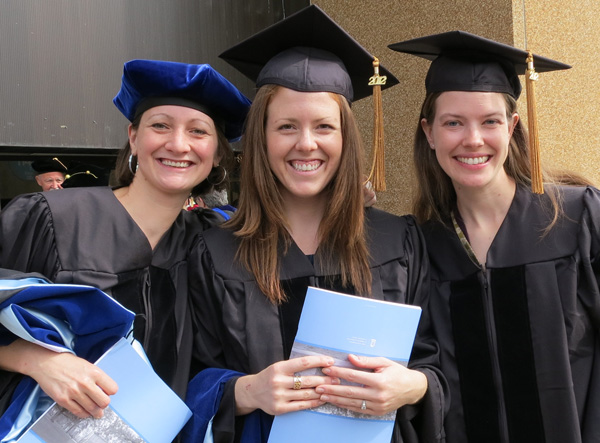The first three UNC Chapel Hill doctoral students to participate in the Autism Leadership Grant’s interdisciplinary program graduated in May 2012.

Dr. Kaitlyn Wilson (Speech and Hearing Sciences), Dr. Lauren Little (Occupational Science), and Dr. Ann Sam (Early Childhood, Special Education, and Literacy) completed a unique set of research-based courses and research and teaching experiences to help prepare them for future teaching, research, and service focused on children with Autism and their families.
Funded by the U.S. Department of Education Office of Special Education and Rehabilitation Services, the Autism Leadership Grant draws on the resources and expertise of the Division of Speech and Hearing Sciences and the Division of Occupational Science and Occupational Therapy within the Department of Allied Health Sciences, School of Medicine; the Early Childhood, Families, and Literacy Studies program in the School Education; and the Program in Developmental Psychology at UNC Chapel Hill. The interdisciplinary project directors are Drs. Betsy Crais, Harriet Able, Grace Baranek, Linda Watson, Steve Reznick, and Sam Odom.
Crais stated that the goal of this personnel preparation grant is to produce academic leaders who can conduct research validating evidence-based practices in autism, translate research into practice, and provide leadership in developing evidence-based programs and policies for children with autism from diverse cultural, linguistic, and socioeconomic backgrounds.
“It’s rare for students across four distinct doctoral programs to have myriad opportunities to interact and collaborate with each other and with faculty from diverse professional backgrounds,” Baranek said. “These experiences provide a major advantage as they take on leadership positions in real-world research, teaching, and practice environments.”
Wilson, Little, and Sam all praised the program for its interdisciplinary nature and for the wide range of opportunities made available to participants.
“The grant allowed me the flexibility to explore many different aspects of autism-related research and to find my own area of interest,” said Wilson. “The curriculum provided me with specialized training, specifically in the areas of translational research, intervention research, and professional development, as they relate to autism. Some of the most valuable opportunities I had were composing grants–both collaboratively and individually–with feedback from experienced and well-funded faculty, engaging in scholarship through participation in international and national conferences focused on autism and developmental disabilities, and developing lifelong relationships, both personal and professional, with classmates and mentors with similar interests and goals.”
Little said that forging new relationships, working with interdisciplinary teams on research, and receiving mentorship and guidance from multiple faculty members were among the highlights of her time in the program. She also praised the variety offered by the curriculum.
“It offered balanced exposure to seminars, research experiences on multiple projects, as well as some clinical experience with families of children with ASD (Autism Spectrum Disorders),” Little said.
Sam said she enjoyed the opportunity to become involved with autism research projects from the very beginning of her graduate school career, and that she especially benefitted from working as a research assistant on a treatment comparison study.
“I was encouraged and supported to determine my own research interests, conduct secondary analyses on the data, and disseminate the findings through conferences and journal articles,” she said. “A high point of my time at UNC was co-authoring my first journal article to be published. It was very exciting to see the article in a journal I had read as a practitioner.”
With their PhDs complete, Sam, Little, and Wilson have started the next phase of their careers. In June, Sam began a two-year postdoctoral training appointment at the 3-C Institute for Social Development. She will be working on projects that use technology to support social skills of children with high-functioning autism. Little will be working as a postdoctoral research associate at UNC with Baranek on the Sensory Experiences Project, which aims to examine the development, functional impact, and cause of various sensory features in children with autism and other developmental delays ages 2-12 years. Wilson is a post-doctoral fellow at the Center for Autism and Related Disorders (CARD) at the Kennedy Krieger Institute, and is coordinating intervention studies working towards better outcomes for students with autism.
